Tuesday, June 10, 2008
Officer testimony--in their own words--shows why Tasers should not be given to untrained Hawaii police who falsely claim they are non-lethal
Taser Loses 1st Product-Liability Suit; Jury Awards $6 Million(Thanks to Vivian Lerner for this article and her amazing vigilance on this issue)
By Margaret Cronin Fisk
June 7 (Bloomberg) -- Taser International Inc., the largest stun-gun maker, lost a $6.2 million jury verdict over the death of a California man who died after police shot him multiple times with the weapon. The defeat is the first for Taser in a product- liability claim.
A San Jose, California, jury yesterday said Taser had failed to warn police in Salinas, California, that prolonged exposure to electric shock from the device could cause a risk of cardiac arrest. The jury awarded $1 million in compensatory damages and $5.2 million in punitive damages to the estate of Robert Heston, 40, and his parents. The jury cleared the police officers of any liability....[Bloomberg News, 6/7/2008]
Tasers kill. At the time I gave my testimony before a legislative committee in February 2007, I cited reports that more than 300 people had died after being tased at that time. It is alleged that the company works to suppress coroners' reports that give tasing as the cause of death, so the actual number was likely much higher than that.
Yet when HB3016, a bill to allow DLNR conservation offices (DOCARE) to be issued Tasers was before the Legislature last session, officer after officer testified that the weapon is "non-lethal." Some testified that an accreditation requirement in the bill be dropped. Some testifiers identified themselves as supervisors or similar, and a few advocated receiving the weapon immediately, without training.
Reading through all the testimony again today, I was frankly—shocked.
If officers and their superiors hold some of the beliefs that are demonstrated in their testimony, then the last thing you want to give them is a Taser.
I'd like to bring snippets of the testimony to readers' attention, but it is very boring stuff. It's here if you ever want to refer to it (better, of course, would be to view the testimony in its entirety). Just skip ahead when boredom sets in.
Some of the testimony filed on the Capitol website includes lines that are blanked out. It may be that officers included their rank, implying that they were testifying in their official capacity. Did they give the testimony with the redactions, or were the redactions made before posting? I don't know.
(I've left out duplicates or near-duplicates. The DLNR officers were clearly given some "talking points" because most of their testimony covered exactly the same issues, only with changes in wording. Some were unique. Many did not refer to the Taser as non-lethal—the phrase "less than lethal" was also popular.)
Here's a snippet of my own testimony to start with:
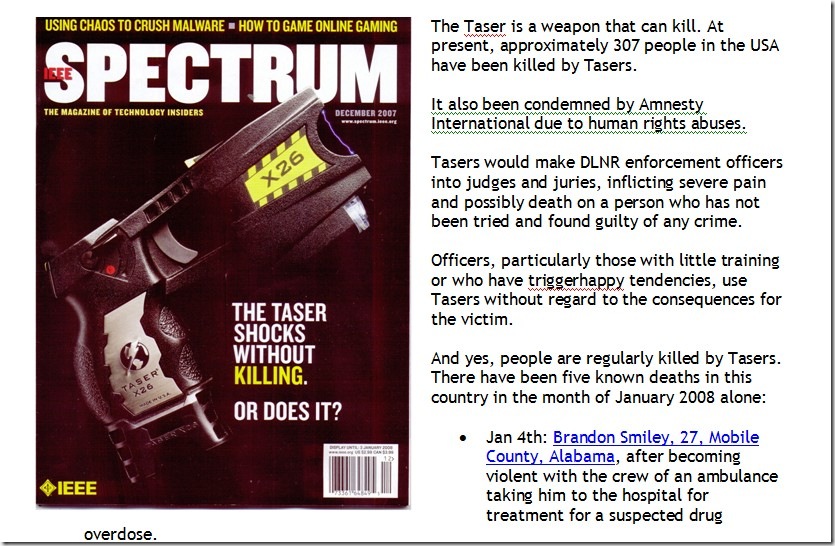
Watch out for this officer. When talking fails, it looks like she thinks it is Taser Time.
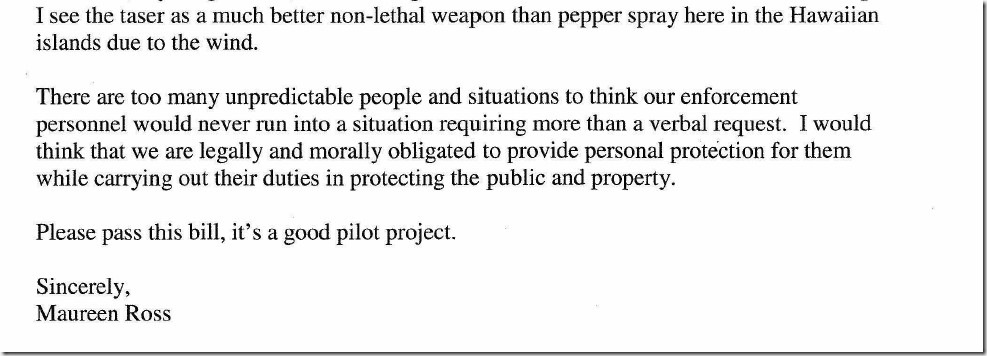
This testimony, apparently by an individual, raises alarm bells. It indicates that Tasers have been issued to officers in Hawaii prior to completion of accreditation:

This testimony by the Nature Conservatory should cause us to ask if officers who just got flashing lights on their cars but who are "inadequately trained" and "lack the equipment they need to do their jobs" should be given Tasers. I don't think these guys are ready yet... how about training them first??

Here's a supervisor who thinks Tasers are non-lethal:

I love this one. Give us the Tasers but it's too difficult for us to get accredited.
This amazing testimony, signed by a supervisor, would like the ok to issue Tasers but without the appropriation for training etc. It acknowledges that there is neither a policy nor a training program in place. Perhaps I'm misunderstanding it, but it seems to ask for Tasers without policy/training, a great reason for not issuing DLNR with those weapons, of course:
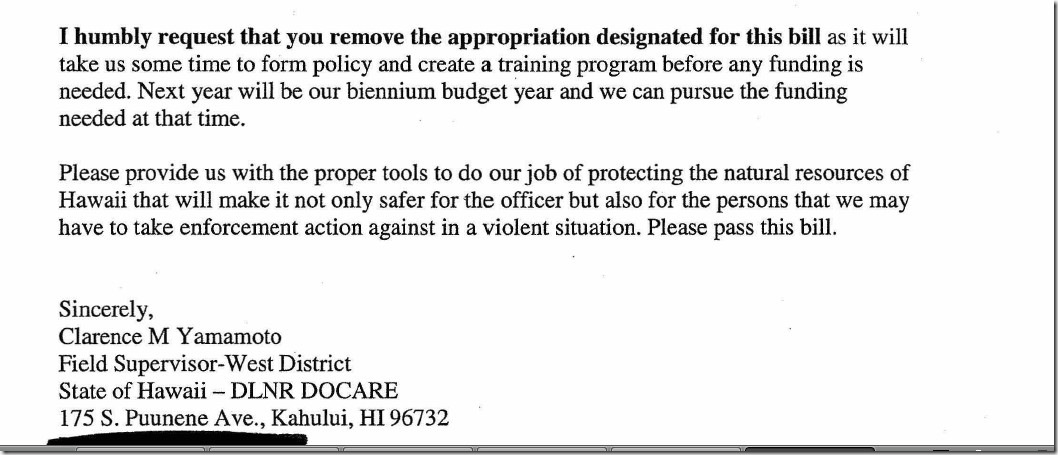
This next one is really interesting to me. ".. in most cases inflicts no permanent damage to the assailant" implies, of course that in some cases it does. Then there is the company claim that deaths when shot by a Taser are due rather to poor health or drug/alcohol intoxication. Of course, this testifier has no plans to ask for a health checkup or do a breathalyzer test before he pulls the trigger. Nor is poor health or intoxication a capital crime, last I checked. But get the last part that I snipped, "Many of our DOCARE officers are senior in age largely due [??] practices and the advanced age required for retirement..." Great reason to give the old codgers Tasers. Because they are apparently too old to do their job. The Legislature might look into this separately to see if it is valid, and meanwhile please protect us from those who are likely to use this weapon because they are incapable of doing anything else!
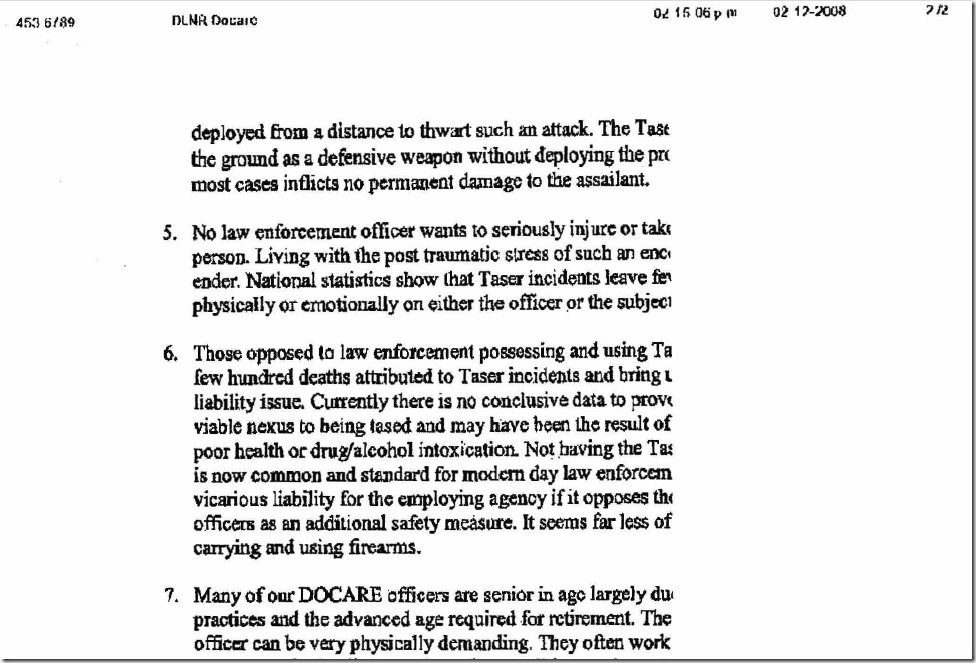
Remember, now, one testifier thinks deaths result when those who are intoxicated are tased. And so they have. Now we have this one, that proposes to use Tasers specifically on all those subjects he encounters who are drug and alcohol users. These two guys should get together and figure it out. Oh, this one thinks it's non-lethal, and you can see how willing an officer might be to actually use one from his testimony:
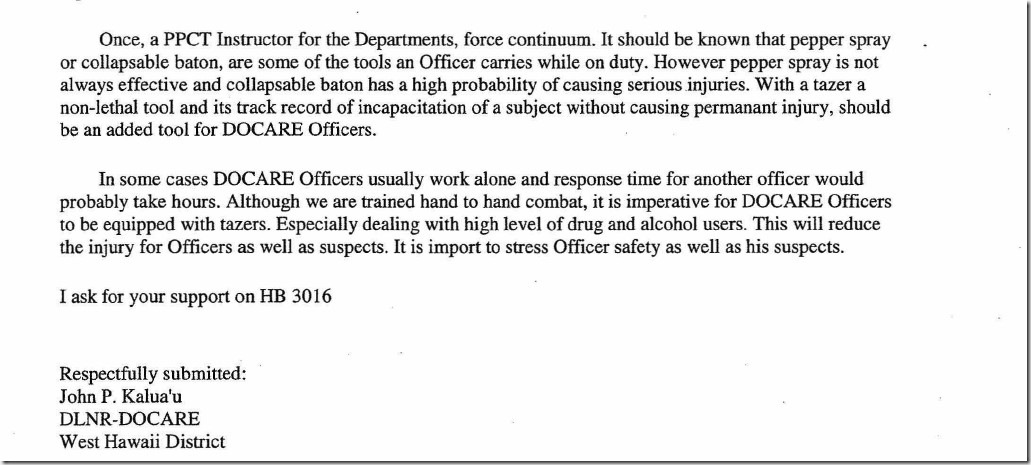
This one is sent from a DOCARE fax and again states that the Taser is non-lethal. Is that now official DOCARE policy?

Ok, now a few demonstrating that the belief that the Taser is non-lethal among these DOCARE testifiers is widespread. I've omitted lots of duplicates and copycats.

Hey... an idea. If "just the sight of a Taser gains voluntary compliance," why not issue them plastic imitation Tasers? This is another person who believe the real thing is non-lethal, so I hold that he should never be issued one until his training is complete.
Here's another supervisor who holds the non-lethal belief:

Here the "compliance" issue raises its head. There is no threat to the officer, but maybe the guy (as actually happened on the Mainland), refused to show his drivers license at a traffic stop and so was tased because he didn't "comply." No joke, the next one tased for compliance purposes could be you. Here it is, in actual testimony:

Yet another non-lethal believer, but otherwise not bad:

Yet another:

"Less lethal" is interesting. It's an admission, of course, that use of this weapon can be lethal, just not as lethal as shooting someone.

One last one, representative of several similar:

Hey, you still here? Thanks for sticking with it.
So we have a demonstrated pattern of belief that the Taser is a non-lethal weapon. Since the language repeats itself consistently in testimony after testimony, it's clear that the officers were given guidance on what to include. The reduction in workman's comp cases was so popular that it had to have come from above. Another popular point was that merely unholstering a Taser would bring about immediate compliance, even in confrontation with drug-crazed subjects.
And that's crucial: officers were being instructed that the use of the Taser is safe, that it is non-lethal. Officers continued to repeat this testimony from committee hearing to committee hearing even though they heard, with their own ears, that the claim of non-lethality is a lie. The ACLU and others testified (as did I). Still, they persisted in telling legislators that Tasers do not kill. (Interestingly, some DOCARE officers omitted the claim of non-lethality but included many or most of the other talking points.)
It's just a question of time before someone is killed by a Taser in Hawaii, but we hasten that time should we allow them to be carried frivolously, or by officers who lack training or the willingness to use safer methods before pulling out their new toy.
When someone is killed or injured and sues, at least because of this testimony, DLNR would seem to have set itself up. If the belief that using this weapon is safe has been advocated by supervisors and others in authority, then the state could be held fully liable.
If old geezers are allowed to use them because they are incapable of exercising the restraint a younger officer might call upon, then we need to overhaul the department entirely.
Let's not subject our citizens to torture, injury and death at the hands of untrained, underfunded, unprepared law enforcement agencies in Hawaii.
Comments:
The lack of DOCARE accreditation being due to lack of funding is a lie and just the tip of the iceberg of the things wrong at DOCARE. In 1998 I spent six months reporting on a story about DOCARE and the abuses its officers are famous for especially on Na Pali and in Kalalau Valley on Kaua`i. I found a few things.
DOCARE has no civilian control which is why they cannot get accreditation. They answer solely to the head of DLNR. There are no standards or processes for discipline.
DOCARE is well know for its acceptance of rogue former police officer. Dozens are former cops who were kicked off the force or forced to resign were immediately employed by DOCARE. I heard dozens of reports- all unacted upon because there was no complaint process- of abuses of power and personal vendettas by DOCARE officers including seizure and subsequent return of hunters’ guns with bent sights, requiring at gunpoint the opening of hatches on kayaks on the open ocean, handcuffing people to helicopters and regular gang beatings and physical abuses of people- even rape- not arrested or charged or charged with camping violations..
The reason they are unaccredited is that under the current set up they could never get accredited.
This was all when Wilson was DLNR chief and it relates to incident and processes on Kaua`i and I don’t know if it’s changed in 10 years except that it remain a paramilitary outfit with no civilian oversight.
<< Home
The lack of DOCARE accreditation being due to lack of funding is a lie and just the tip of the iceberg of the things wrong at DOCARE. In 1998 I spent six months reporting on a story about DOCARE and the abuses its officers are famous for especially on Na Pali and in Kalalau Valley on Kaua`i. I found a few things.
DOCARE has no civilian control which is why they cannot get accreditation. They answer solely to the head of DLNR. There are no standards or processes for discipline.
DOCARE is well know for its acceptance of rogue former police officer. Dozens are former cops who were kicked off the force or forced to resign were immediately employed by DOCARE. I heard dozens of reports- all unacted upon because there was no complaint process- of abuses of power and personal vendettas by DOCARE officers including seizure and subsequent return of hunters’ guns with bent sights, requiring at gunpoint the opening of hatches on kayaks on the open ocean, handcuffing people to helicopters and regular gang beatings and physical abuses of people- even rape- not arrested or charged or charged with camping violations..
The reason they are unaccredited is that under the current set up they could never get accredited.
This was all when Wilson was DLNR chief and it relates to incident and processes on Kaua`i and I don’t know if it’s changed in 10 years except that it remain a paramilitary outfit with no civilian oversight.
<< Home



Post a Comment
Requiring those Captcha codes at least temporarily, in the hopes that it quells the flood of comment spam I've been receiving.